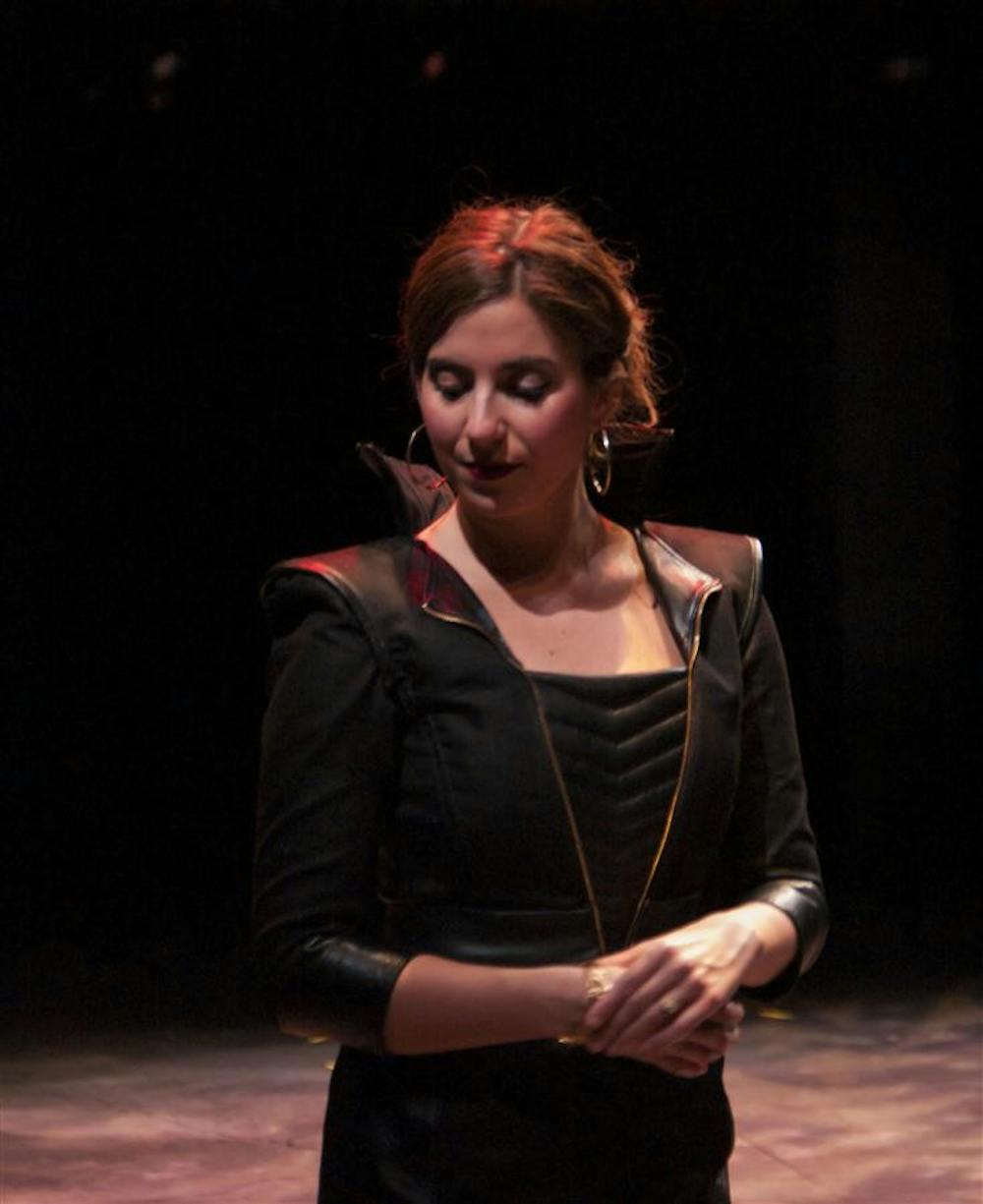The sound of voices and pounding feet resonated across the Wells-Metz Theatre Monday night.
Cast and crew for the IU Department of Theatre and Drama’s latest production, “Richard III,” prepared for an evening of rehearsal.
Performances of “Richard III” will begin at 7:30 p.m. Friday.
William Shakespeare’s famous lines will fall from the casts’ lips during additional performances at the same time Saturday and next Monday through Saturday.
Written in 1597, the play follows the story of Richard, the hunchback Duke of Gloucester.
He becomes King Richard III through a series of heinous acts, including the murder of several of his kinsmen.
Forming the backdrop for “Richard III,” England’s late-1400s War of the Roses between the houses of York and Lancaster is in many ways similar to feudal gang wars today.
“There’s a certain learning curve or education that needs to be had about the War of the Roses to understand the context of ‘Richard III,’” said Aaron Kirkpatrick, who is playing the role of Richard. “The Tudors, which became the line of the monarch that Elizabeth was part of, who is the queen during Shakespeare’s time, sort of usurps the throne at the end of the play, setting the stage for the play to warp the perception of the way Richard lived his life and who he actually was to sort of flatter and build up their own right to the throne.”
To make the play more relatable to the audience, guest director Gavin Cameron-Webb presents the old rivalry with the face of a modern-day feud.
“The perceptions of the motorcycle gang war provide a good context for us to see ‘Richard III’ in,” Cameron-Webb said. “This play takes place during the War of the Roses. Those wars were essentially gangland wars. They were fighting for power in the same way that ganglands are today, and the nobles in the 15th century acted like a gang of thugs. There wasn’t a lot that was noble about them.”
Cameron-Webb did not attempt to modernize the story in the script.
“I think it will make it a great deal more relatable because it’s a context we all understand today,” Cameron-Webb said.
He said the characters in the play should be easy to spot and identify due to modern additions.
“The bonus for us is that this world’s affinities for tattoos and badges help us keep track of the characters,” Webb said. “Their names are on their clothes.”
Kirkpatrick said King Richard III was a real king, though the play is based off propaganda by Thomas More, who was involved with the Tudors.
“The approach has to do with the effectiveness of propaganda,” Cameron-Webb said. “The play was written over 400 years ago and is a lie.”
Though historically not as evil as depicted in the play, Richard III was labeled a vicious usurper in the Tudor monarchs’ histories.
Shakespeare presents Richard III as such in his play, as it was never intended to be historically accurate, Cameron-Webb said.
Cameron-Webb has incorporated the use of “fact-checkers,” flat-screen televisions that display accurate, historical facts above Shakespeare’s version.
“This version of ‘Richard III’ has endured for centuries,” Cameron-Webb said. “The image of the character presented in the play is just not true historically. The play was so effective as a piece of propaganda that it really didn’t matter.”
Kirkpatrick said it is harder for people today to connect with the Elizabethan era because they have nothing to relate it to in their own lives.
“You want to be able to create, not just the world that’s provided through the text, but some sort of overlaid visuals that a modern audience can interpret through their own experiences and lives,” Kirkpatrick said.
Decked out in leather jackets, dresses and boots, the cast walks and looks like gang thugs, but their voices ring with the majesty of Shakespeare.
Sophomore Cassie Alexander, playing the Duke of York, described her character as a brat.
“He’s 10 at the time of the play, extremely clever and completely full of himself,” Alexander said in an email. “He’s the younger son of the King of England, so he won’t inherit the crown. But he’s very aware of the political climate and his position.”
Alexander said stepping into the role of Duke of York has been a new adventure.
“Not the least because I get to reverse-cross-dress in a Shakespeare play,” Alexander said. “Also, I get to play a character half my age, which is something every woman covets.”
Alexander said the role gave her the chance to develop a complete physical and vocal character.
“Even though I only appear as York in two scenes, I got to fully experience the character development process because York and I are so different,” Alexander said.
She said her favorite character moment is when she jumps on Richard’s back.
“In the scene, I’ve just been teasing my brother and insinuating that he’s lazy,” Alexander said. “Then, in the span of a second, I’m running around and playing. That childlike ability to change course in a moment is quite fun to embody.”
At the very beginning of the play, Kirkpatrick will stand under the spotlights in the theater and utter the famous first lines:
“Now is the winter of our discontent / Made glorious summer by this sun of York.”
More information
What: “Richard III” by William Shakespeare, directed by Gavin Cameron-Webb
When: 7:30 p.m. Friday and Saturday, next Monday through Saturday with an additional 2 p.m. showing Oct. 27
Where: Wells-Metz Theatre
Tickets: $25 general admission, $15 students, $20 senior citizens
Student Rush Tickets: $10 cash with valid student ID on the day of the performance
IU Theatre and Drama to perform Richard III

Get stories like this in your inbox
Subscribe





